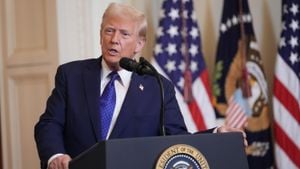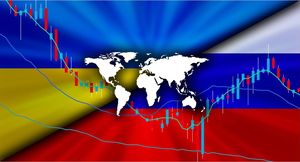South Africa is engaging in urgent diplomatic maneuvers to secure its trade interests amid deteriorated relations with the United States, particularly as it prepares to host the G20 foreign ministers' meeting this week. Discontent is rising within the Trump administration, which threatens the country’s status under the African Growth and Opportunity Act (AGOA), jeopardizing thousands of jobs and millions of dollars worth of exports.
Recent visits by South African officials to both China and Europe reflect the necessity of solidifying support before approaching Washington. South African President Cyril Ramaphosa is holding meetings with local business leaders to discuss strategies for lowering tensions with the US. The country’s relationship with the second-largest trading partner after China hangs precariously as US politicians call for the exclusion of South Africa from AGOA, which grants duty-free access to US markets for certain goods.
Khulekani Mathe, CEO of the Business Unity organization, has expressed concerns over the country's precarious position. “We have not been in this position before and things are significantly bad compared to past instances,” Mathe stated, illustrating the gravity of South Africa's diplomatic situation.
The situation worsened following allegations by Trump’s administration, claiming South Africa was seizing land belonging to white farmers, accusations which Pretoria vehemently denies. Tensions escalated to the point where the US froze funding to South Africa earlier this year. South African Foreign Minister Ronald Lamola countered US claims, affirming the nation’s commitment to promoting equitable land opportunities for all of its citizens, dismantling past apartheid-era inequities.
The repercussions of losing AGOA benefits are anticipated to hit the South African economy hard, particularly impacting manufacturers and exporters, as fruit and nut producers would see significant competitiveness losses. Chief economist Wandile Sihlobo emphasized this, saying, “Losing AGOA would affect the competitiveness of South African products as they would have an average 3% added to their price.” These statistics raise the stakes for the South African economy, which heavily relies on exports to the US.
The upcoming G20 meeting highlights the complexity of international relations for South Africa. With US Secretary of State Marco Rubio announcing his decision to skip the event, citing discontent for its agenda, which he claims promotes anti-American sentiment, South Africa's diplomatic position is put to the test. Rubio’s absence means the opportunity for the US to advance its interests at the summit will be significantly reduced. His statements criticized the focus on diversity, equity, and inclusion at the G20, indicating his preference for more traditional security discussions. “My job is to advance America’s national interests, not waste taxpayer money or coddle anti-Americanism,” Rubio later told the press.
Robust discussions around equitable treatment for nations of the Global South dominate the agenda, reflecting the shifting nature of global diplomacy. South Africa’s leadership within the G20 as the first African country to assume presidency is seen as symbolic. Despite Rubio's absence, nations such as Russia and various EU countries are expected to reaffirm their presence and support the summit’s focus on inclusive economic growth.
Political analysts warn Rubio’s boycott could create space for nations like Russia and China to push their narratives without US scrutiny. Steven Gruzd from the South African Institute of International Affairs commented, “Will we see the increase of countries like Russia and China pushing their lines? That’s entirely possible.”
Brooks Spector, a retired US diplomat, criticized Rubio’s decision, calling it “a serious misstep.” He asserted the importance of South Africa and the US leveraging such international platforms to voice their positions and address differences. Meanwhile, other G20 representatives showcased unity, with ambassadors from European nations posting their commitment to shared democratic values alongside South Africa.
South Africa's diplomatic relations with powerful allies are at the heart of this challenging scenario. The country is balancing its interests as it seeks to maintain trade benefits with the US, navigate increasing ties with other global powers like China and Russia, and address distress within its economy. This diplomatic balance is key as South Africa prepares for its pivotal role at the G20 summit later this year, where engagements could re-shape its international relations for years to come.
The stakes remain high for South Africa as it seeks to ward off potential sanctions and maintain economic stability. The country must tread carefully, ensuring it does not provoke the ire of the Trump administration, whose actions could threaten the country's economic resilience.



